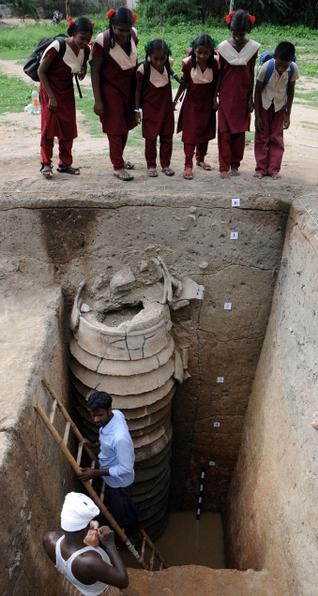
Romans used the city as a transit hub to trade with northern States
For ancient Romans, Chennai was not just another trading port town along the coastline. Instead, the city was a key transit hub for them to carry out their trade.
New findings have emerged after a team of archaeologists from the Tamil Nadu State Archaeology Department found broken pieces of roulette ware, a Roman royal household ware, at an excavation site in Pattarai Perambadur, a small village with around 600 farming families on the western outskirts of Chennai.
“Presence of roulette ware far away from the coastline is interesting because it indicates Romans traded beyond coastal towns,” R. Sivanantham, deputy director, Tamil Nadu State Archaeology Department, told The Hindu.
Funded by the State government , the three-month-long excavation, which ended last Tuesday, was monitored by the Commissioner of the Department, D. Karthikeyan. The team comprised J. Baskar, archaeological officer (Chennai); J. Ranjith, Arcot curator; and P. Baskar, epigraphist, Poompuhar.
Three sites excavated
Archaeologists said this was the first time evidence has emerged on Roman presence in western parts of the city, indicating they travelled away from the coastline. The three ancient sites – Nathamedu, Aanaimedu and Irularthoppu – in Pattarai Perambadur village were excavated with 12 trenches.
The team found most of the 200 antiques, including stone tools, pot shreds, beads made of ivory, glass and terracotta, conical jars and a ring well from Irularthoppu hamlet in three small trenches.
Palaeolithic age
They found an entire sequence of habitations since the early Palaeolithic age (10,000 years ago) to early Christian era.
Presence of rouletted ware, conical jars, hopscotch, lid knob of various sizes and a deer horn indicated that the site acted as transit route to the Romans for trading.
For instance, a two-feet-high conical jar with holes was among the findings. As per the Encyclopaedia of Indian Archaeology, such jars with holes were found mainly in ancient towns such as Bairat and Sambar in Rajasthan and in Vaishali (Bihar). Such jars were used to hold incense sticks.
First time in T.N.
Interestingly, the jar with holes has been found for the first time in Tamil Nadu, the team members said.
They believe that as it was an ancient town located along the Kosasthalaiyar, the site might have been a key link connecting the Romans with northern States via Andhra Pradesh. Pot shreds with boat graffiti found at the site also support this theory because transporting goods by boats was common during the ancient times, the team members said.
“As the site was located en-route Kancheepuram, a trading and cultural capital during the ancient times, the Romans, before proceeding northwards, might have halted there. Northern traders might have done the same before going to Kancheepuram,” said D. Thulasiraman, regional assistant director (retired) of the Archaeology Department.
Archaeologists have found rouletted ware, conical jars, lid knobs of various sizes and deer horn
source: http://www.thehindu.com / The Hindu / Home> News> Cities> Chennai / D Madhavan / Chennai – July 04th, 2016